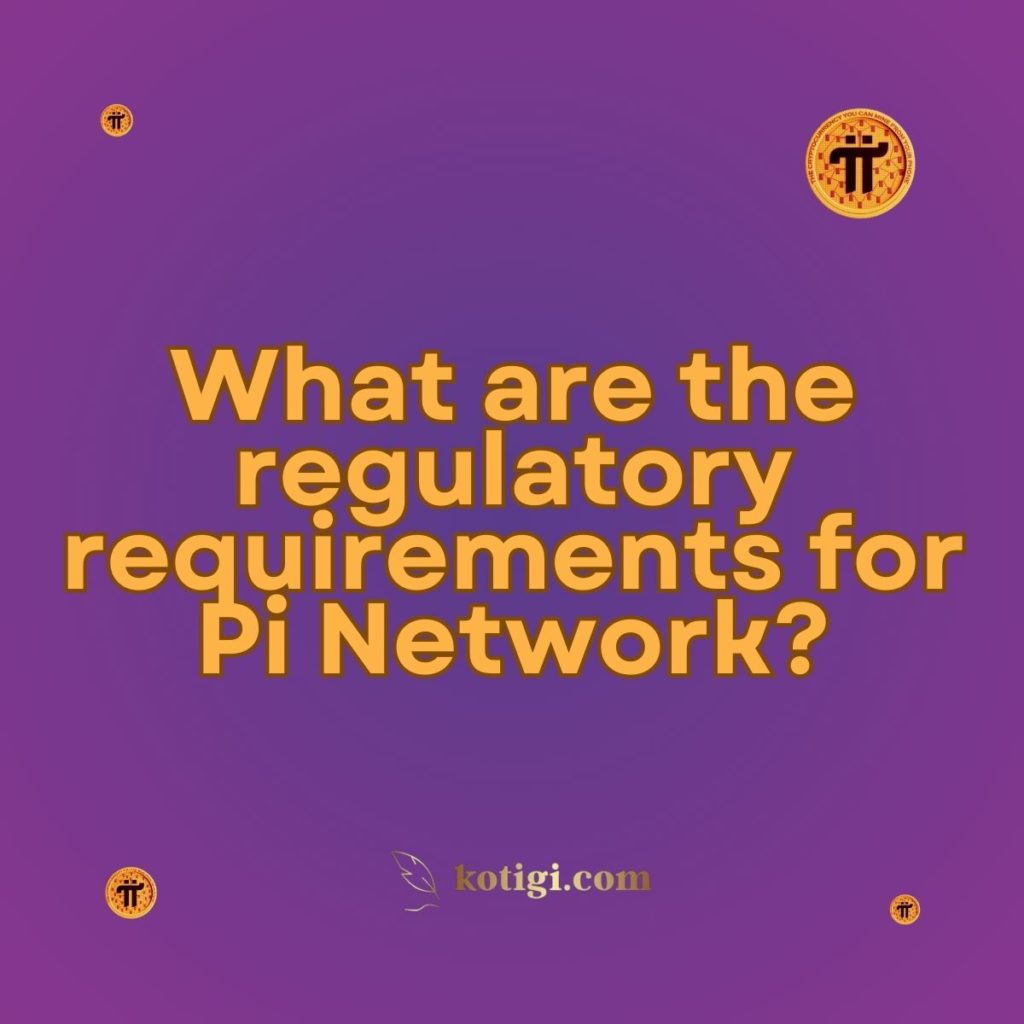
What are the regulatory requirements for Pi Network?
The regulatory requirements for Pi Network encompass a range of considerations, including compliance with securities laws, data protection regulations, anti-money laundering (AML) practices, tax obligations, and user agreements, all of which play a vital role in ensuring the network’s legitimacy and sustainability.
Introduction
As a blockchain-based cryptocurrency project, Pi Network operates within a highly dynamic and complex regulatory environment. Navigating these regulations is not merely an obligation; it is a foundational aspect of establishing credibility and trust among its users and stakeholders. Regulatory compliance serves as a safeguard, ensuring that Pi Network not only adheres to legal frameworks but also aligns with best practices that can enhance user experience and promote broader acceptance of its platform. This post aims to explore the multifaceted regulatory requirements that Pi Network must consider to thrive within the cryptocurrency landscape, emphasizing their importance for its sustainability and user engagement.
Regulatory Requirements for Pi Network
This table outlines the key regulatory requirements that Pi Network must adhere to in order to operate within the legal frameworks of various jurisdictions. Compliance with these regulations is essential for ensuring the legitimacy of the network, protecting users, and fostering trust within the cryptocurrency ecosystem.
| Regulatory Requirement | Description |
|---|---|
| Legal Framework | Comply with local, national, and international laws governing cryptocurrencies, including securities regulations. |
| Know Your Customer (KYC) | Implement identity verification procedures to ensure the legitimacy of users and prevent fraud. |
| Anti-Money Laundering (AML) | Establish measures to detect and report suspicious activities to prevent money laundering and terrorist financing. |
| Data Protection Compliance | Adhere to data protection laws (e.g., GDPR) to safeguard user data and ensure privacy rights are respected. |
| Consumer Protection Laws | Ensure transparency in operations, protect user rights, and comply with advertising regulations to avoid misleading claims. |
| Tax Compliance | Facilitate tax reporting for users, ensuring compliance with tax obligations in different jurisdictions. |
| Licensing Requirements | Obtain necessary licenses to operate as a cryptocurrency platform, depending on the regulatory environment in each region. |
| Smart Contract Regulation | Ensure smart contracts comply with legal standards and can be audited for transparency and accountability. |
| Securities Regulation | Determine whether any aspects of Pi Network’s offerings classify as securities and comply with relevant regulations. |
| Engagement with Regulatory Bodies | Maintain open communication with regulatory authorities to stay updated on regulatory changes and demonstrate compliance. |
This structured approach to regulatory requirements helps Pi Network navigate the complexities of the legal landscape, ensuring sustainable growth and user trust.
1. Legal Framework
Navigating the legal framework is essential for Pi Network’s operations, ensuring compliance with various national and international laws. Every jurisdiction has its own set of rules governing cryptocurrencies, and understanding these differences is vital.
1.1 Jurisdictional Compliance
Pi Network must operate within the legal frameworks of the jurisdictions where it has users. This means gaining a deep understanding of the laws that govern cryptocurrencies in each country, which can vary significantly. Some countries may fully embrace cryptocurrency, while others may impose stringent restrictions or outright bans. This duality creates both opportunities and challenges for Pi Network, as it must tailor its approach based on local regulations to ensure its operations remain legal and viable.
1.2 Licensing Requirements
Depending on the country, Pi Network may need to secure specific licenses to operate legally. These licenses could include those for payment processing, financial services, or operating as a cryptocurrency exchange. Acquiring these licenses can involve rigorous application processes, ongoing compliance checks, and periodic renewals, making it imperative for Pi Network to maintain a proactive approach to its regulatory obligations.
1.3 Intellectual Property Laws
To protect its innovations and market position, Pi Network must comply with intellectual property laws. This includes safeguarding its brand, logos, and technological advancements from unauthorized use or infringement. Intellectual property rights are crucial for establishing a competitive edge and fostering user confidence in the platform’s uniqueness and reliability.
2. Know Your Customer (KYC)
KYC regulations are critical for preventing fraud and ensuring that Pi Network users are who they claim to be. Implementing robust KYC protocols is not just a regulatory requirement but also a best practice that enhances the security of the entire network.
2.1 Identity Verification
Implementing robust identity verification processes is necessary to comply with KYC regulations. This may involve collecting personal information such as names, addresses, and identification documents. By confirming the identities of users, Pi Network can reduce the risk of fraud and ensure that its platform is used responsibly.
2.2 Risk Assessment
Pi Network needs to assess the risk profiles of its users to determine the level of scrutiny required for compliance. Higher-risk users may require more thorough verification processes, allowing Pi Network to allocate resources effectively and focus on users who may pose greater risks to the platform’s integrity.
2.3 Ongoing Monitoring
Regular monitoring of user transactions is vital to detect suspicious activities, ensuring that the network remains compliant with KYC regulations over time. This ongoing vigilance can help identify patterns that indicate fraudulent behavior or compliance breaches, thereby protecting both the network and its users.
3. Anti-Money Laundering (AML) Regulations
AML regulations play a crucial role in preventing illicit financial activities within the Pi Network ecosystem. Compliance with these regulations helps maintain the integrity of the network and builds trust among users.
3.1 Transaction Monitoring
To comply with AML regulations, Pi Network must establish systems to monitor transactions for suspicious behavior. This includes tracking large or unusual transactions that may indicate money laundering. By employing advanced algorithms and monitoring tools, Pi Network can quickly identify potentially illicit activities and take appropriate action.
3.2 Reporting Obligations
In certain jurisdictions, Pi Network may be required to report suspicious transactions to relevant authorities. Developing a clear protocol for these reports is essential for compliance, ensuring that the network can effectively communicate any concerns without delay.
3.3 Employee Training
Regular training for employees on AML regulations and compliance procedures ensures that the team is equipped to recognize and respond to potential money laundering activities effectively. By fostering a culture of compliance, Pi Network can enhance its defenses against financial crime.
4. Data Protection and Privacy
With increasing scrutiny on data privacy, Pi Network must comply with relevant data protection laws to safeguard user information. Protecting personal data is not only a legal requirement but also a critical component of maintaining user trust.
4.1 GDPR Compliance
In regions governed by the General Data Protection Regulation (GDPR), Pi Network must implement strict data protection measures, including obtaining user consent for data collection and processing. Failure to comply with GDPR can result in hefty fines and reputational damage, underscoring the importance of rigorous data management practices.
4.2 Data Encryption
Implementing robust encryption methods to protect user data both in transit and at rest is essential for maintaining compliance with data protection regulations. By ensuring that sensitive information is encrypted, Pi Network can protect its users from data breaches and unauthorized access.
4.3 User Rights
Pi Network must ensure that users are aware of their rights regarding their data, including the right to access, rectify, and delete their personal information. Transparency in data handling practices fosters user confidence and encourages greater participation in the network.
5. Consumer Protection Laws
Adhering to consumer protection laws is vital for maintaining user trust and satisfaction within the Pi Network ecosystem. By prioritizing consumer rights, Pi Network can enhance its reputation and encourage more users to join the platform.
5.1 Transparent Communication
Providing clear and accurate information about the services offered by Pi Network helps users make informed decisions, complying with consumer protection regulations. This transparency can reduce misunderstandings and build stronger relationships with users.
5.2 Dispute Resolution Mechanisms
Establishing effective dispute resolution mechanisms is crucial for addressing user complaints and ensuring a fair resolution process. By providing users with accessible channels to voice their concerns, Pi Network can demonstrate its commitment to user satisfaction.
5.3 Advertising Regulations
Pi Network must comply with advertising regulations to ensure that promotional materials are truthful and not misleading. This commitment to honesty protects consumers from false claims and enhances the overall integrity of the network.
6. Tax Compliance
Understanding tax obligations is essential for both Pi Network and its users to avoid legal complications. Compliance with tax laws not only safeguards the network but also promotes responsible behavior among users.
6.1 Tax Reporting
Pi Network must establish processes to facilitate tax reporting for users who may need to report their cryptocurrency holdings and transactions. By providing resources and guidance, Pi Network can help users navigate their tax obligations more easily.
6.2 Understanding Tax Jurisdictions
Compliance with tax laws in various jurisdictions is crucial, as users may be subject to different tax regulations based on their location. This complexity necessitates a comprehensive understanding of the tax implications of using Pi Network.
6.3 User Education
Educating users about their tax obligations regarding cryptocurrency transactions fosters transparency and encourages responsible practices within the network. By offering resources and guidance, Pi Network can empower its users to make informed decisions.
7. Regulatory Adaptability
As regulations continue to evolve, Pi Network must remain adaptable to maintain compliance and support its growth. This flexibility is essential for navigating the ever-changing landscape of cryptocurrency regulations.
7.1 Monitoring Regulatory Changes
Establishing a system for monitoring changes in regulations helps Pi Network stay informed and ready to adapt its practices accordingly. This proactive approach can mitigate risks and ensure compliance in real-time.
7.2 Engaging with Regulatory Authorities
Building relationships with regulatory bodies can provide valuable insights and facilitate smoother operations within different jurisdictions. By engaging in open dialogue, Pi Network can better understand regulatory expectations and demonstrate its commitment to compliance.
7.3 Implementing Flexible Systems
Developing flexible compliance systems that can easily adapt to new regulations ensures that Pi Network can respond effectively to any changes. This adaptability is critical for sustaining growth and maintaining user trust.
Conclusion
In conclusion, understanding and adhering to regulatory requirements is vital for the success of Pi Network. By navigating the complexities of legal compliance, KYC protocols, AML regulations, data protection laws, and consumer protection measures, Pi Network can enhance user trust and drive adoption. As the regulatory landscape evolves, maintaining flexibility and adaptability will be key to sustaining its growth in the competitive cryptocurrency market.
Key Takeaways
- The regulatory landscape is crucial for Pi Network’s operations and growth.
- Compliance with KYC and AML regulations enhances user security and builds trust.
- Data protection and privacy laws safeguard user information and rights.
- Understanding consumer protection laws fosters transparency and user satisfaction.
- Tax compliance is essential for both Pi Network and its users to avoid legal issues.
- Regulatory adaptability ensures that Pi Network remains compliant as regulations evolve.




